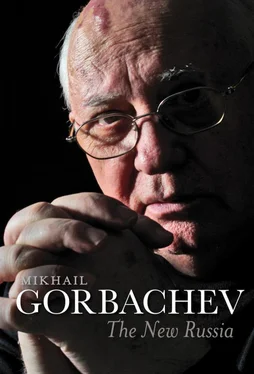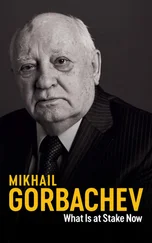Mikhail Gorbachev
THE NEW RUSSIA
Translated by Arch Tait
Preface: Perestroika and the Future
This is a book about the relevance of the past. Reflecting on what happened to Russia and Russians at the end of the last and beginning of this century, and what awaits Russia in the future, you inevitably come back to the years of Perestroika. Today, more than two decades separate us from that time, but it is probably still too early to attempt any final assessment. Chou En-Lai is said to have replied to President Richard Nixon’s question of how he assessed the French Revolution: ‘It is too soon to judge.’ He may have been right, yet much can already be seen more clearly.
Today there is again a great sense in Russia of a need for change. Society cannot feel satisfied with the current situation. The attempts at reform undertaken in the past two decades have not been seen through to the end. Of course, we cannot say there have been no changes in people’s lives, but many of their hopes have been disappointed and there has been no genuine renewal of life in the interests of the majority of our citizens.
A dead-end political situation, economic stagnation, a build-up of unresolved social problems, violation of the rights and dignity of citizens: all this is only too reminiscent of the state of the country before Perestroika, and people are not happy. Although it has proved possible to temporarily stifle the protest movement that began in December 2011, it is impossible to suppose that those presently in power are unaware of citizens’ discontent.
It is no longer possible to say, as we have been doing for very many years, that Russia needs time, that changes of this magnitude cannot be rushed. That is perfectly true, and I have often used that argument in my speeches and in conversations with foreign politicians. Now, however, the process of transition has been going on for two and a half decades, and with every year that passes the argument becomes less convincing.
How should we respond to this state of affairs? What should we do? I am concerned that many are looking for the answer in the wrong direction. They believe it can be found by abandoning the democratic achievements of the Perestroika period. There are attempts to rehabilitate authoritarianism and return to its techniques of administrative pressure and tightening the screws. They extol conservatism and try to turn it into a state ideology, claiming that is more in tune with our traditions and Russia’s ‘cultural code’.
In President Putin’s speeches we hear him quoting conservative Russian philosophers like Ivan Ilyin and Konstantin Leontiev. They cannot be detached from the times in which they lived and contemplated, and we are living in the twenty-first century, a century of new technologies and new challenges. Conservative ideology has no answer to these. Traditional, conservative values do, along with others, have their place in society. But where have conservative policies taken us in the history of Russia? They have led, as a rule, to stagnation followed by upheaval. Sometimes the years of stagnation have been relatively prosperous, living off reforms carried through earlier and favourable external factors. Sooner or later, however, that energy runs out, the external factors change.
The present Russian regime need have no delusions that conservatism is a panacea for our problems, lulling themselves with the belief that for the sake of peace and quiet people will agree to put up with stagnation. They are wrong. I am increasingly convinced that all they are doing is playing for time, clinging to power for its own sake, clutching at the benefits that a minority is able to extract from the current state of affairs.
But people are not blind and their patience is not limitless. They have demonstrated in protest on Bolotnaya Square and Sakharov Prospekt, demanding change. If there is none, the protests will not just be repeated but will become more radical. This would be dangerous and must be avoided. Russia really does not need more turmoil; she needs change, change that opens the way to a genuine renewal of society and improvement in people’s lives.
The road will not be straightforward, but in the Perestroika years we did what was most difficult by breaking free of the totalitarian past. At that time and later, we were to live through many moments of high drama, but I am certain that was not in vain.
My message to Russia and the world is a message of hope.
On 8 August 2013 the newswires of many agencies and media reported: ‘Mikhail Gorbachev, the first and last Soviet president, has died, according to a message on the Twitter account of RIA Novosti. He was 82 years old. There is as yet no official confirmation of this information.’
The phone rang. It was Andrey Karplyuk. He reports now for the ITAR-TASS news agency but used to work for Interfax, and we have kept in touch for several years now.
‘Mikhail Sergeyevich, I phone you quite often, but this call is not altogether routine.’ I sensed he was smiling. ‘What I mean is, the reason is a bit unusual.’
‘Go on,’ I said.
‘Well, RIA Novosti is reporting that Gorbachev died during a visit to St Petersburg and I didn’t believe it.’
‘Neither do I’, I said, and we burst out laughing.
The ‘news’ was taken off the wire within nine minutes, and the following day I had a letter from the agency staff:
Dear Mikhail Sergeyevich,
We are desperately sorry that hackers have exploited your name in their latest publicity-seeking attempt to discredit the media. Please accept our profound apologies for the shameful sensation caused by the hacking of our agency’s accounts on social networks and the posting of hoax information about you.
We do not regard this as a straightforward practical joke or mere act of hooliganism but believe it is a crime that must be investigated. RIA Novosti is sending a statement to the law-enforcement agencies about this hacking of our Twitter channels and we will do everything in our power to ensure that the incident and all the previous hoax reports are thoroughly investigated.
This is not the first time mainstream media have been abused to spread false information, but the latest incident is just too serious, cynical and immoral to be ignored.
Mikhail Sergeyevich, you know how profoundly we respect you and we are deeply distressed that this attack on Novosti has involved you. No doubt attempts to falsify the news and hoax attempts will continue, but we wish to assure you and all our readers that we will do everything we can to quash them promptly.
My relationship with RIA Novosti goes back a long time, and in spring 2013 I gave a talk in their offices to a large number of young people, with the title, ‘Does the individual change politics, or does politics change the individual?’ I talked about my life, current concerns, and all the obstacles on the road to democracy that Russia has yet to travel. My audience listened attentively and asked plenty of questions. Meeting the young people left me with a good feeling. It always does. A day to remember.
And then this hoax. What was behind it? This was not the first time: Gorbachev has been ‘buried’ many times, and I know why.
Someone out there has a grudge against Perestroika, and lies are their weapon of choice. Libel, inexcusable fabrications and distortion of the facts. That is how it was all those years ago, and the same weapon is still being used today.
There is no shortage of examples. In December 1990, at the Congress of People’s Deputies, Anatoly Lukianov, the speaker of the USSR Supreme Soviet, for some reason almost immediately gave the floor to a certain Sazha Umalatova, who called for a vote of no confidence in President Gorbachev to be put on the agenda. The delegates declined the invitation. In 1991, at the April plenum of the Communist Party’s Central Committee, I was subjected to such venomous ‘psychological warfare’ that I said, ‘I give up! How can anyone be the general secretary of two, three or even five Communist Parties at the same time?’ The Politburo persuaded me to stay on.
Читать дальше












